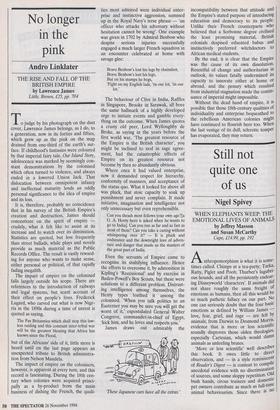No longer in the pink
Andro Linklater
THE RISE AND FALL OF THE BRITISH EMPIRE by Lawrence James Little, Brown, £25, pp. 704 To judge by his photograph on the dust cover, Lawrence James belongs, as I do, to a generation, now in its forties and fifties, which grew up as the pink on the map drained from one-third of the earth's sur- face. If childhood's fantasies were coloured by that imperial fairy tale, Our Island Story, adolescence was marked by seemingly con- stant demonstrations by the colonised which often turned to violence, and always ended in a lowered Union Jack. That dislocation between omnipotent infancy and ineffectual maturity lends an oddly personal significance to the idea of empire and its loss.
It is, therefore, probably no coincidence that in his survey of the British Empire's creation and destruction, James should concentrate on the spirit of empire crudely, what it felt like to assist at its increase and to watch over its diminution. Statistics are quoted, but less frequently than street ballads, while plays and novels provide as much material as the Public Records Office. The result is vastly reward- ing for anyone who wants to make sense, either personal or political, of that rapidly fading megalith.
The impact of empire on the colonised falls largely outside his scope. There are references to the introduction of railways and legal systems, but scant account of their effect on people's lives. Frederick Lugard, who carved out what is now Nige- ria in the 1890s during a time of unrest is quoted as saying,
The Pax Britannica which shall stop this law- less raiding and this constant inter-tribal war will be the greatest blessing that Africa has known since the Flood,
but of the Africans' side of it, little more is heard until on the last page appears an unexpected tribute to British administra- tion from Nelson Mandela.
The impact of empire on the colonisers, however, is apparent at every turn, and this record is fascinating. During the 18th cen- tury when colonies were acquired princi- pally as a by-product from the main business of dishing the French, the quali- ties most admired were individual enter- prise and instinctive aggression, summed up in the Royal Navy's terse phrase — 'an officer who attacks his adversary without hesitation cannot be wrong'. One example was given in 1702 by Admiral Benbow who despite serious injuries successfully engaged a much larger French squadron in an encounter celebrated at home with savage glee:
Brave Benbow's lost his legs by chainshot, Brave Benbow's lost his legs, But on his stumps he begs, 'Fight on my English lads, 'tis our lot, 'tis our lot.'
The behaviour of Clive in India, Raffles in Singapore, Brooke in Sarawak, all bore the same hallmark of a highly developed urge to initiate events and gamble every- thing on the outcome. When James quotes a crusty old peer, Lord Wylloughby de Broke, as saying in the years before the first world war, 'The greatest resource of the Empire is the British character', you might be inclined to nod in sage agree- ment, had the catastrophic effects of Empire on its greatest resource not become by then so abundantly obvious.
Where once it had valued enterprise, now it demanded respect for hierarchy, conformity of manners, and acceptance of the status quo. What it looked for above all was pluck, that stoic capacity to soak up punishment and never complain. It made initiative, imagination and intelligence not only unnecessary but even reprehensible.
Can you thrash most fellows your own age?[a G. A. Henty hero is asked when he wants to go to India]. Can you run as far and as fast as most of them? Can you take a caning without whimpering over it? — It is pluck and endurance and the downright love of adven- ture and danger that made us the masters of the great part of India.
Even the servants of Empire came to recognise its stultifying influence. Hence the efforts to overcome it, by admonition in Kipling's 'Recessional' and by exercise in Baden-Powell's Boy Scouts, but these were solutions to a different problem. Distrust- ing intelligence among themselves, the Henty types loathed it among the colonised. 'When you talk politics to an Easterner you may be sure you will get the worst of it,' expostulated General Walter Congreve, commander-in-chief of Egypt, 'kick him, and he loves and respects you.'
James draws out admirably the These Japanese cars have all the extras.' incompatibility between that attitude and the Empire's stated purpose of introducing education and democracy to its people. Unlike their French counterparts who believed that a Sorbonne degree civilised the least promising material, British colonials despised educated babus and instinctively preferred witchdoctors to African medical students.
By the end, it is clear that the Empire was the cause of its own dissolution. Resentful of change and authoritarian in outlook, its values fatally undermined its capacity to innovate either at home or abroad, and the penury which resulted from industrial stagnation made the contin- uance of imperial might impossible. Without the dead hand of empire, it is possible that those 18th-century qualities of individuality and enterprise bequeathed to the rebellious American colonies might have continued to flourish here too. When the last vestige of its dull, sclerotic temper has evaporated, they may return.










































































 Previous page
Previous page